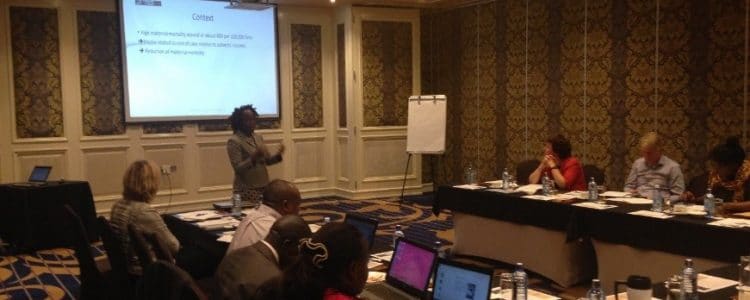
The research consortium on the ‘Cost-effectiveness of free healthcare versus private health insurance in Kenya’ organized stakeholder forums on 16 and 17 September 2015 in Nairobi and Eldoret. The forums were preceded by a two-day workshop in which the research team reviewed the data and research methodology. Prior to this, suitable data sets were organized and checked by the research consortium partners.
The forums provided the researchers with an opportunity to meet with stakeholders at both national and county levels. At the meeting in Nairobi, 17 people participated, including representatives from the Office of the President, Nairobi City County, Ministry of Health, Kenyatta University Hospital, local and international NGOs (including PharmAccess Foundation), and community-based organizations. At the meeting in Eldoret, 15 people participated, including representatives from the Nandi County Government, Ministry of Health Nandi County, PharmAccess Foundation, and district and sub-district hospitals. The meetings aimed to inform policy-makers, NGOs, healthcare workers and other stakeholders about the research project and allow policy-makers to provide input on how the research could be shaped to be more relevant to them.
From the forums we learnt that there is broad support for our research. We also learnt more about the programmes being evaluated by the project. Knowledge gaps were identified in the field of policy communication, including: how the decision on free maternal care and free primary care were made, how these were communicated, and what guidelines were given to whom. Another gap concerns the perceptions of clients (especially women) towards maternal care that influence clients’ behaviour in accessing professional healthcare services.
Lastly, the research group discussed ways of keeping our stakeholders informed. It was agreed that biannual updates will be disseminated to all stakeholders and, in turn, stakeholders will inform the research consortium of any issues relevant to the research. In addition, stakeholders in the Free Maternal Care programme were identified and invited to be part of the Panel Advisory Committee for the study. The meeting concluded with a visit to two clinics in Nandi County, a public facility and a mission facility.
As a result of the workshop the consortium identified three key areas that would benefit from additional research: qualitative research in the policy process of free primary and maternal care, qualitative research on the barriers and constraints for women to deliver in a health facility, and further data collection on the costs of the free healthcare policy and private insurance. The consortium has drafted a proposal to fund the desired additional research, which is pending approval.




